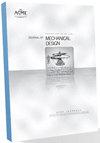Reman Co-Design: A Combined Design and Remanufacturing Optimization Framework for the Sustainable Design of High-Value Components
IF 3
3区 工程技术
Q2 ENGINEERING, MECHANICAL
引用次数: 0
Abstract
Abstract Remanufacturing is a process that returns end-of-life equipment to as-new conditions and offers numerous environmental and economic benefits. To fully capitalize on remanufacturing, its synergistic interactions with design must be fully realized and addressed during the design stage. Although this fact is widely recognized in the literature, most of the current studies focus primarily either on the design or remanufacturing aspects of design for remanufacturing (DfRem). In an effort to offer a more integrated DfRem approach than those reported in the literature, we propose a new combined design and remanufacturing optimization (reman co-design) framework that takes a holistic approach by leveraging the intricate interplay between design and remanufacturing. The aim of this formulation is to identify the optimal decisions that maximize the benefits of remanufacturing throughout the entire lifespan of a product. To showcase the utility of the new formulation, we are using a case study of a hydraulic manifold, (re)manufactured by John Deere. Using this industry example, we compare the results of reman codesign to the ones from a decoupled remanufacturing design approach. Results reveal that remanufacturing benefits are better realized and improved upon when using the developed reman co-design approach.余曼协同设计:高价值零部件可持续设计的设计与再制造组合优化框架
摘要再制造是一个将报废设备恢复到新状态的过程,提供了许多环境和经济效益。为了充分利用再制造,必须在设计阶段充分认识和解决其与设计的协同作用。虽然这一事实在文献中得到广泛认可,但目前大多数研究主要集中在再制造设计(DfRem)的设计或再制造方面。为了提供比文献中报道的更集成的DfRem方法,我们提出了一个新的组合设计和再制造优化(剩余协同设计)框架,该框架通过利用设计和再制造之间复杂的相互作用,采用整体方法。该公式的目的是确定在产品的整个生命周期内使再制造利益最大化的最佳决策。为了展示新配方的实用性,我们以约翰迪尔(John Deere)生产的液压歧管为例进行了研究。通过这个行业实例,我们将剩余协同设计的结果与解耦再制造设计方法的结果进行了比较。结果表明,采用所开发的剩余物协同设计方法可以更好地实现和提高再制造效益。
本文章由计算机程序翻译,如有差异,请以英文原文为准。
求助全文
约1分钟内获得全文
求助全文
来源期刊

Journal of Mechanical Design
工程技术-工程:机械
CiteScore
8.00
自引率
18.20%
发文量
139
审稿时长
3.9 months
期刊介绍:
The Journal of Mechanical Design (JMD) serves the broad design community as the venue for scholarly, archival research in all aspects of the design activity with emphasis on design synthesis. JMD has traditionally served the ASME Design Engineering Division and its technical committees, but it welcomes contributions from all areas of design with emphasis on synthesis. JMD communicates original contributions, primarily in the form of research articles of considerable depth, but also technical briefs, design innovation papers, book reviews, and editorials.
Scope: The Journal of Mechanical Design (JMD) serves the broad design community as the venue for scholarly, archival research in all aspects of the design activity with emphasis on design synthesis. JMD has traditionally served the ASME Design Engineering Division and its technical committees, but it welcomes contributions from all areas of design with emphasis on synthesis. JMD communicates original contributions, primarily in the form of research articles of considerable depth, but also technical briefs, design innovation papers, book reviews, and editorials.
 求助内容:
求助内容: 应助结果提醒方式:
应助结果提醒方式:


